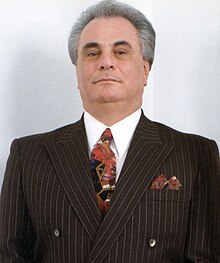
Back جون غوتي Arabic John Gotti AST Джон Готи Bulgarian John Gotti Czech John Gotti Welsh John Gotti Danish John Gotti German Τζον Γκότι Greek John Gotti Spanish John Gotti Basque
John Gotti | |
|---|---|
 1990 mugshot | |
| Born | John Joseph Gotti Jr. October 27, 1940 New York City, New York, U.S. |
| Died | June 10, 2002 (aged 61) |
| Resting place | St. John Cemetery, New York City, New York, U.S. |
| Other names | The Teflon Don, The Dapper Don, Johnny Boy, Crazy Horse |
| Occupation | Crime boss |
| Predecessor | Paul Castellano |
| Successor | Peter Gotti |
| Spouse |
Victoria DiGiorgio (m. 1962) |
| Children | 5; including Victoria |
| Relatives |
|
| Allegiance | Gambino crime family |
| Conviction(s) | Hijacking (1968) Attempted manslaughter (1975) Murder, conspiracy, conspiracy to commit murder, loansharking, racketeering, obstruction of justice, illegal gambling, tax evasion (1992) |
| Criminal penalty | Three years' imprisonment Four years' imprisonment; served two years Life imprisonment without the possibility of parole and fined $250,000 |
John Gotti[1][note 1] (/ˈɡɒti/ GOT-ee, Italian: [ˈɡɔtti]; October 27, 1940 – June 10, 2002) was an American mafioso and boss of the Gambino crime family in New York City. He ordered and helped to orchestrate the murder of Gambino boss Paul Castellano in December 1985 and took over the family shortly thereafter, leading what was described as America's most powerful crime syndicate.
Gotti and his brothers grew up in poverty and turned to a life of crime at an early age. Gotti quickly became one of the Gambino family's biggest earners and a protégé of Aniello Dellacroce, the family's underboss, operating out of Ozone Park, Queens. Following the FBI's indictment of members of Gotti's crew for selling narcotics, Gotti began to fear that Castellano would kill him and his brother Gene for dealing drugs. As this fear continued to grow, and amidst growing dissent over the leadership of the family, Gotti arranged the murder of Castellano.
At his peak, Gotti was one of the most powerful and dangerous crime bosses in the United States. While his peers generally avoided attracting attention, especially from the media, Gotti became known as "The Dapper Don" for his expensive clothes and outspoken personality in front of news cameras. He was later given the nickname "The Teflon Don" after three high-profile trials in the 1980s resulted in acquittals, though it was later revealed that the trials had been tainted by jury tampering, juror misconduct and witness intimidation. Law enforcement continued gathering evidence against Gotti, who reportedly earned between $5 million and $20 million per year as Gambino boss.[4]
Gotti's underboss, Salvatore "Sammy the Bull" Gravano, aided the FBI in convicting Gotti; in 1991, Gravano agreed to turn state's evidence and testified against Gotti after hearing the boss make disparaging remarks about him on a wiretap that implicated them both in several murders. In 1992, Gotti was convicted of five murders, conspiracy to commit murder, racketeering, obstruction of justice, tax evasion, illegal gambling, extortion and loansharking. He received life in prison without parole and was transferred to United States Penitentiary, Marion in Illinois.
Gotti died of throat cancer on June 10, 2002, at the United States Medical Center for Federal Prisoners in Springfield, Missouri. According to Anthony "Gaspipe" Casso, the former underboss of the Lucchese crime family, "what John Gotti did was the beginning of the end of Cosa Nostra."[5]
- ^ Capeci, Mustain (1996), pp. 25–26
- ^ "Gotti Jr. on Living and Leaving a Life of Crime". 60 Minutes. CBS News. April 11, 2010. Archived from the original on March 11, 2011. Retrieved February 25, 2011.
- ^ Ferranti, Seth (May 8, 2018). "Why We're Still So Obsessed with John Gotti". vice.com. Vice Media. Retrieved March 12, 2021.
- ^ Cite error: The named reference
maas452was invoked but never defined (see the help page). - ^ Philip Carlo, Gaspipe: Confessions of a Mafia Boss, 2008. Page 134.
Cite error: There are <ref group=note> tags on this page, but the references will not show without a {{reflist|group=note}} template (see the help page).